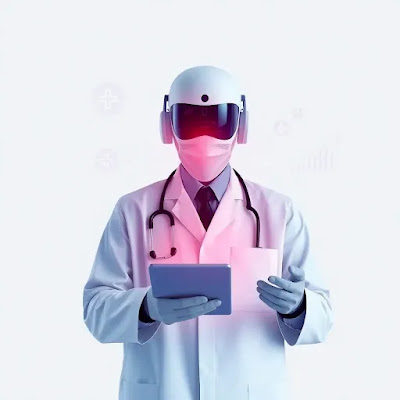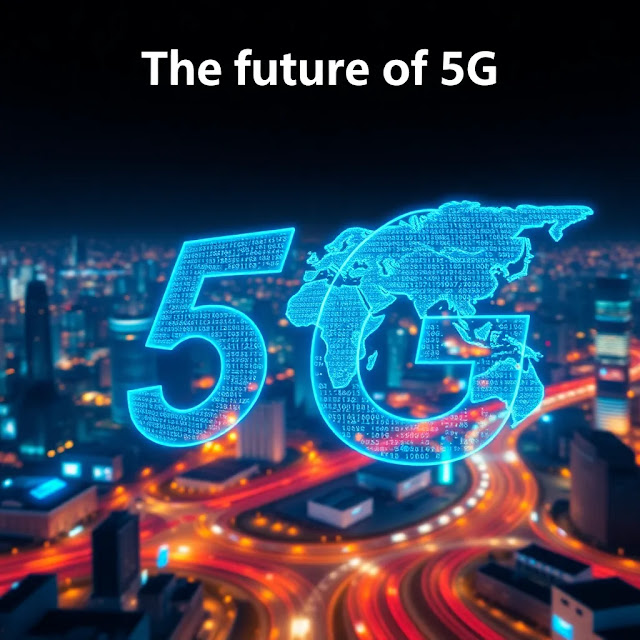The global rollout of 5G technology is a major step forward in wireless communications. With faster delivery speeds lower latency and more reliable connectivity than its predecessors, 5G promises to revolutionize the industry. Empowering Smart Cities Transforming the way people live, work and interact with technology. But it goes beyond faster downloads and smoother video streaming across society, industries, and global markets - and its even more profound impact on the economy lies. In this article, we explore the rise of 5G technology, its impact on Various sectors and its meaning for the future.
What is 5G?
5G or fifth generation wireless technology 4G's successor (LTE) represents the latest iteration of mobile networks. While 4G brought us fast internet and laid the foundation for mobile apps, 5G is expected to do even more. A lot The main features are:
Increased speeds: 5G offers speeds up to 100 times faster than 4G, with download speeds of up to 10 gigabits per second (Gbps)...
Reduced Latency: Specifies the delay before data transfer begins as per 5G latency instructions. Latency can be reduced to 1 millisecond, enabling communication between devices. almost immediately
Increased capacity: 5G allows networks to support more devices at once without congestion. This is a major advantage for densely populated areas and the number of connected devices is increasing...
While these improvements may seem like technical jargon to many, they have far-reaching implications for practical applications in everyday life and across major industries.
Impact on consumers
The most immediate benefit of 5G for everyday consumers is faster mobile internet. And with better connectivity in crowded areas like stadiums, airports and city centers, 5G enables high-definition streaming. Play online games without lag. And a better mobile experience. However, the impact goes beyond entertainment.
One of the most important benefits for consumers is smart home technology. As home devices from refrigerators to lighting become more interconnected, 5G will support seamless communication between them. This improved connectivity makes a smart home more responsive and efficient. It allows consumers to easily control multiple devices. Even from a faraway place
5G also has the potential to revolutionize wearable technology. From fitness trackers to augmented reality glasses. Wearable devices will be able to process and transmit data in real-time. Leading to better healthcare monitoring and immersive experiences
Impact on healthcare
Perhaps one of the most exciting applications of 5G is in the healthcare sector. With 5G's ultra-low latency and high-speed data transmission, telemedicine can take a significant step forward. Doctors can consult patients remotely in real-time. Make a diagnosis and even perform certain procedures using robots in different locations. This may make health care more accessible. This is especially true in rural and underserved areas where medical professionals may be in short supply.
5G can also make remote surgery a reality. Surgeons can operate from miles away using technology such as robotic arms. There is no communication delay between the surgeon's movements and the robot's actions. Ability to perform surgery without the need for a surgeon on site It can lead to faster response to emergencies. And increasing access to specialized medical procedures around the world.
5G also enables faster processing of large data sets from wearable devices. It gives doctors a more comprehensive understanding of a patient's health over time. Personalized medicine, where treatment is tailored to each individual. Improvements can also be seen through rapid analysis of genetic and health data. Made by a system that supports 5G...
Impact on driverless vehicles and transportation
Another sector that could greatly benefit from 5G is transportation. This is especially true of autonomous vehicles. To make self-driving cars work safely Fast communication between vehicles and infrastructure such as traffic lights and road sensors is required. 5G's low latency ensures that driverless vehicles can receive and respond to information about road conditions. Other vehicles and obstacles in real-time This greatly improves safety and efficiency...
The development of smart cities is also linked to 5G, with high-speed data exchange between vehicles. Infrastructure and public services, cities can optimize traffic flow, reduce accidents, and improve public transportation. Smart street lights that adapt to traffic patterns Real-time environment monitoring and automated traffic management are just some examples of how 5G – will make cities more efficient and safer.
Impact on the industry
In the industrial sector, 5G will be a game changer for manufacturing, logistics and seupply chains. Factories will become more efficient and flexible through the use of industrial IoT (Internet of Things), where machines and equipment can communicate with each other and be managed remotely in real-time...
This is especially important for smart factories, which rely on automation and robots to carry out complex production tasks. 5G allows devices to share data instantly. This allows for better synchronization and less downtime. In addition, predictive maintenance will be improved. This is because machines can detect defects or wear and tear before they cause failure. This reduces significant disruption to production...
The logistics sector will benefit from 5G-enabled real-time tracking. Companies can monitor shipments in real-time. Instantly optimize delivery routes and respond more effectively to delays or disruptions. This level of connectivity and data transparency leads to faster delivery. More reliable and increase customer satisfaction
Security concerns and challenges
Although there are many advantages the growth of 5G is not without its challenges. Safety is a major concern. Due to the increased connectivity of devices, networks are becoming more vulnerable to cyber attacks. Especially The proliferation of IoT devices creates more potential entry points for hackers. This requires strong cyber security measures.
Moreover, The geopolitical implications of 5G cannot be ignored. The international race to dominate 5G infrastructure has raised concerns about espionage and control of critical digital networks. As a result, countries are becoming more cautious about the companies they allow to build and maintain their 5G networks.
The infrastructure required for 5G is also critical. Deploying 5G will require the installation of thousands of new cell towers and small cell sites. This is especially true in rural areas where coverage is often sparse. This can be a time-consuming and expensive endeavor.
The future of 5G
The global rollout of 5G is still in its early stages. But its potential is already evident. As more countries and industries embrace 5G, the world will see innovations in healthcare, transportation, manufacturing, and consumer technology. Which once belonged to science fiction.
However, the potential of 5G won't be realized overnight. It will take time to build the infrastructure and address the security and regulatory concerns that come with such transformative technology, but 5G is poised to be the cornerstone of the next digital revolution. It creates new opportunities and redefines the way we interact with technology and the world around us.
Conclusion The rise of 5G has opened a new era of connectivity. The implications extend beyond faster downloads and smoother video streaming. It promises to transform the industry. Improve public services and improve the quality of life around the world. When we look ahead It is clear that the future of 5G is not only faster but also faster. But it's also getting smarter and more…powerful and connected in ways we're just beginning to understand.







No comments:
Post a Comment